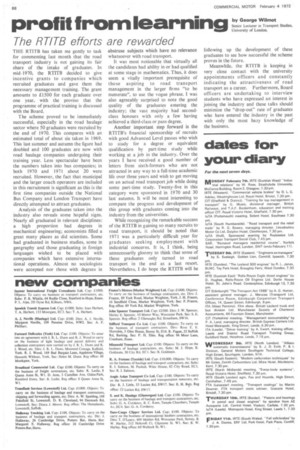profit from learning t y nto?!e o c r tr: in trort Studies,
Page 92

If you've noticed an error in this article please click here to report it so we can fix it.
University of London.
The RTITB efforts are rewarded
THE RTITB has taken me gently to task for commenting last month that the road transport industry is not gaining its fair share of the intake of graduates. In mid-1970, the RTITB decided to give incentive grants to companies which recruited graduates and gave them the necessary management training. The grant amounts to £.1500 for each graduate over one year, with the proviso that the programme of practical training is discussed with the Board.
The scheme proved to be immediately successful, especially in the road haulage sector where 50 graduates were recruited by the end of 1970. This compares with an estimated total of about six taken in 1969. This last summer and autumn the figure had doubled and 100 graduates are now with road haulage companies undergoing their training year. Less spectacular have been the numbers taken into bus companies; in both 1970 and 1971 about 20 were recruited. However, the fact that municipal and the larger coach operators are included in this recruitment is significant as this is the first time companies outside the National Bus Company and London Transport have directly attempted to attract graduates.
Analysis of the graduates taken into the industry also reveals some hopeful signs. Nearly all graduated in relevant disciplines: a high proportion had degrees in mechanical engineering; economists filled a great many places as did scientists. Some had graduated in business studies, some in geography and those graduating in foreign languages wished to be placed with companies which have extensive international operations. Almost no sociologists were accepted nor those with degrees in abstruse subjects which have no relevance whatsoever with road transport.
It was most noticeable that virtually all the candidates had ability in or had qualified at some stage in mathematics. Thus, it does seem a vitally important prerequisite of those aspiring to road transport management in the larger firms "to be numerate", to use the vogue phrase. I was also agreeably surprised to note the good quality of the graduates entering the industry; the vast majority had secondclass honours with only a few having achieved a third-class or pass degree.
Another important step forward is the RTITB's financial sponsorship of recruits with good Advanced Level passes who wish to study for a degree or equivalent qualification by part-time study while working at a job in the industry. Over the years I have received a good number of letters from sixth-formers who are not attracted in any way to a full-time academic life over three years and wish to get moving on an actual road transport job while doing some part-time study. Twenty-five in this category were sponsored in 1970 and 30 last autumn. It will be most interesting to compare the progress and development of this group with graduates coming into the industry from the universities.
While recognizing the remarkable success of the RTITB in gaining so many recruits to • road transport, it should be noted that 1971 was a particularly difficult year for graduates seeking employment with industrial concerns. It is, I think, being unnecessarily gloomy to think that some of these graduates only turned to road transport in the end as a last resort. Nevertheless, I do hope the RTITB will be following up the development of these graduates to see how successful the scheme proves in the future.
Meanwhile, the RTITB is keeping in very close contact with the university appointments officers and constantly indicating the attractiveness of road transport as a career. Furthermore, Board officers are undertaking to interview students who have expressed an interest in joining the industry and these talks should minimize the "drop-out" rate of graduates who have entered the industry in the past with only the most hazy knowledge of the business.














































































































































